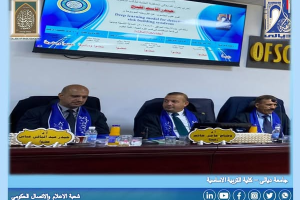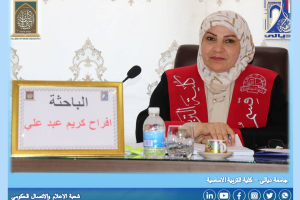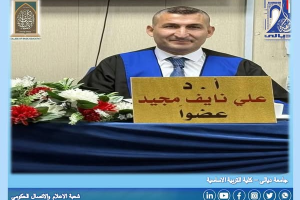Dr. Omar is an MA Thesis Committee Member
Assistant Dean for Student Affairs at Diyala Basic Education is a member of the Master’s Thesis Discussion Committee at the Faculty of Islamic Sciences at Diyala University
Prof. Dr. Omar Rahman Hamid, Assistant Dean for Student Affairs at the Faculty of Basic Education, discussed the master’s thesis entitled (the trilogy of creation, making and harnessing in Surat Al-Nahl, a study in Quranic miracle) for the student (Alya Ali Hussein) from the Faculty of Islamic Sciences, Department of Qur’anic Sciences and Islamic Education, University of Diyala
The study aimed to clarify the linguistic and semantic meanings of the vocabulary of creation, making and harnessing, and indicating the nuances between them in terms of Qur’anic usage and analyzing the places of occurrence of these terms in Surat al-Nahl and indicating their connection to the general context of the Surah and its purposes.
The study dealt with the semantic and graphical analysis of three recurring Quranic vocabulary words in Surat al-Nahl, namely creation, generation and harnessing, as a linguistic triad that performs distinct contractual and rhetorical functions.
The study focused on highlighting the miracle of the Quran in the accuracy of choosing these words and employing them in their appropriate places, within the context of the surah, which was characterized by the presentation of divine blessings and the inference of them on the oneness of God and the obligation to thank Him, and sought to clarify the semantic difference between these words and show their harmony with the doctrinal and thematic structure of the surah.
The study concluded that after tracing the verses of Surat al-Nahl in the light of the trilogy of creation, making, and harnessing, this trilogy constitutes an integrated system that plays a pivotal role in building faith and belief concepts in the surah and highlights the miracle of the Qur’an in rhetorical and semantic presentation.
The study found that the employment of this trilogy in the surah came in the context of presenting divine blessings to consolidate the principle of monotheism and urge humans to reflect, thank, and reject polytheism.





